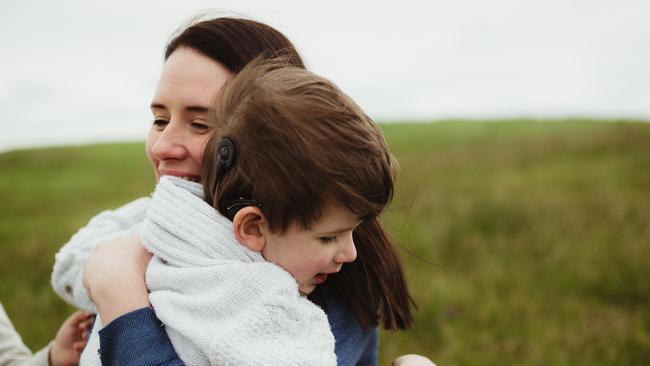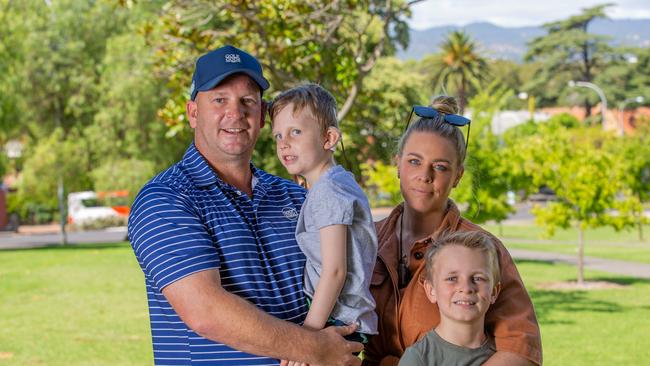Huge payouts as scathing report into WCH implant scandal released
Families of children involved in the WCH cochlear implant scandal will receive thousands of dollars after a scathing review found problems with the service dating back years.
SA News
Don't miss out on the headlines from SA News. Followed categories will be added to My News.
Families of children caught up in the Women’s and Children’s Hospital cochlear implant scandal will be paid up to $50,000 after a scathing review found longstanding systemic problems with the service dating back 17 years.
Up to 30 children had their implants wrongly programmed, potentially causing developmental delays – these families will receive a one-off $50,000 payment which does not affect their compensation rights.
Other families in the program will receive $5000 in recognition of their stress.
The independent review made 59 recommendations and the government says it will act on them all.
It found inadequate processes, policies, competency frameworks for staff and a lack of appropriate clinical training in the program dating back many years, and inadequate compliance as the “under-mapping” incidents were initially reviewed.
The report identified 208 children who have received care through the program since 2006.
A separate clinical review is underway by interstate provider NextSense offering assessments to each family to determine how many of the 208 children were affected.
The WCH has already committed more than $2m over four years for additional staffing for the service and the government will fund further costs as the recommendations are implemented.
An additional $1.3m will be spent on new equipment for the newborn hearing screening program.
Premier Peter Malinauskas said the report makes “harrowing reading” and there is potentially “very substantial adverse outcomes for those young children.”
“These families have every right to be very angry and very upset,” he said.
“It is simply not good enough that South Australian children have been failed by a hospital service with significant gaps in cochlear implant mapping procedures and policies dating back nearly two decades.
“My heart goes out to affected families and I want them to know that we are adopting all 59 recommendations and putting additional funding in to overhaul the service and ensure severe errors like this are not repeated.
“While no amount of money can fix the problems of the past, we recognise the immense stress this has caused families and that’s why we are offering initial upfront payments.”
The Women’s and Children’s Hospital has struggled with controversies of late, including:
PAEDIATRIC Intensive Care Unit losing its teaching accreditation, with a scathing report revealing shortcomings including times when no doctor was present, a protocol that has since been changed. The unit has since been given provisional accreditation and a $20m funding boost;
NEONATAL Intensive Care Unit only being granted provisional teaching accreditation;
215 WCH doctors signing a letter outlining major problems at the hospital, which The Advertiser ran on the front page in February 2020;
169 WCH doctors signing an open letter to The Advertiser in November 2020 pleading for more staff and equipment;
DEBATE about whether the hospital should have a cardiac surgery unit instead of transferring infants and children interstate for such surgery.
Women’s and Children’s Hospital Network board chair Associate Professor Christine Dennis said she will do everything in her power to ensure the required improvements are made.
“South Australian children and families deserve better and I want to assure them that we have their interests at the forefront in making these changes,” she said.
The report was released as the scandal deepened with a mother revealing her son was cleared by the WCH as not needing his implant adjusted when in fact it was wrongly programmed – for five years.
Henry Selby, 9, was cleared when news of the scandal broke last year but his worried mother Lisa sought a second opinion which found the implant not working correctly.
She said she had Henry checked by two audiologists who both found the implant needed adjustment as he was only hearing very soft sounds.

“It is very upsetting to realise he was not getting the full benefits of his cochlear implant as he was implanted when he was four, and is now nine years old,” Mrs Selby said.
“It is distressing to be told that our son wasn’t part of the 30 kids affected when clearly he has been affected. We are very concerned about other children out there whose family might not know there are any issues and who have blindly trusted the information told to them.
“We would urge others to seek further external follow-up and that the review looks more deeply into children outside of the 30 identified as we don’t want others to be in the position we are in where they found out through an external source, despite being told their child was not affected.”
Opposition Leader David Speirs, described the latest development as “devastating for all families involved in the cochlear implant bungle”.
“Learning Henry was evaluated by the review and his family assured the mapping was correct – only to find out this isn’t true at all – means the review cannot be trusted,” he said.
Health Minister Chris Picton said he is willing to meet the family to discuss their concerns.
Parents such as Dale and Lauren Smedley, whose son, Logan, 5, was fitted with the implants, were distraught as the truth emerged.

“As a result of the hospital’s failure to turn up Logan’s cochlear implants over approximately four years, we believe he is severely delayed in his hearing and his speech,” Mr Smedley said at the time the review was announced.




